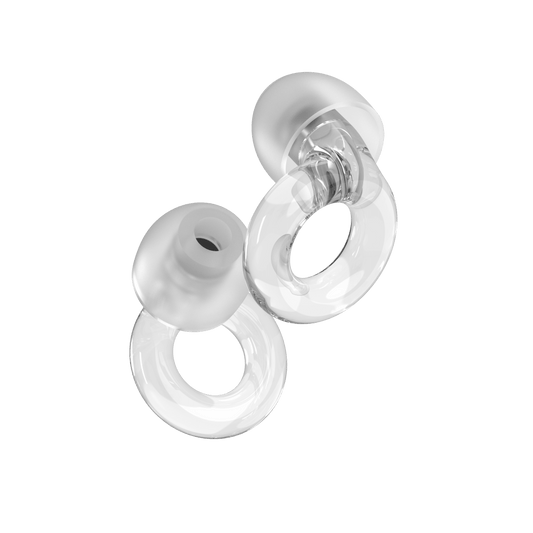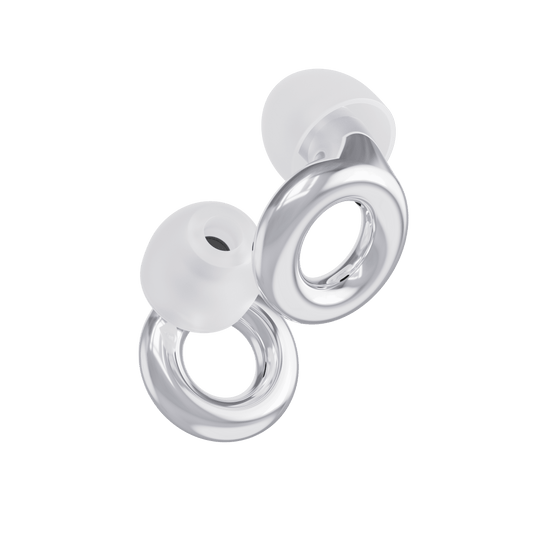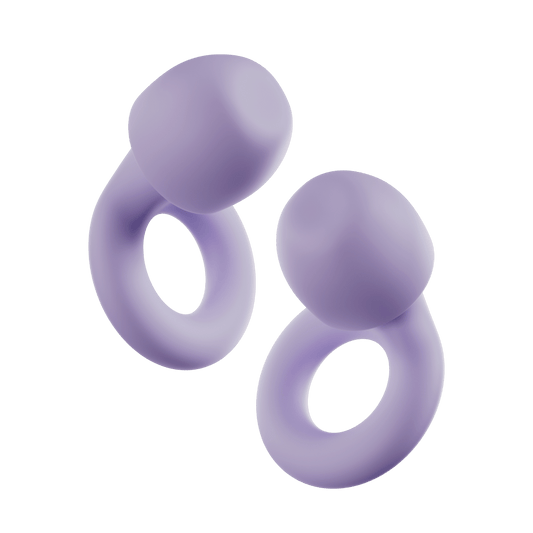Key takeaways
- Noise anxiety comes in many forms, with the most common types of noise sensitivity being phonophobia, misophonia and hyperacusis
- You may not be able to completely cure noise anxiety
- But there are lots of ways to manage your noise anxiety, including sound therapy, CBT, support groups and stress management
Do loud environments often make you feel panicked or overwhelmed? Well, you’re not alone. Noise anxiety is a common issue, and while different people experience it to varying degrees, it can be difficult to deal with for anyone.
For some people, anxiety can be triggered by unexpected noises such as fireworks, backfiring cars, or sudden shouting. For others, simple everyday sounds such as chewing, music, and coughing can cause significant distress. At the more extreme end of the scale, noise sensitivity issues can have a big impact on people’s lives, leading them to avoid certain situations and become socially isolated.
But you don’t need to resign yourself to living a life of anxiety and sensitivity to noise. Let’s take a look at the most common kinds of noise anxiety and how to cope with noise anxiety so you can live a more comfortable life.

Common types of sound sensitivity and anxiety
There are several types of sensitivity and anxiety caused by loud and distressing noises, some of which have overlapping symptoms. Some of the most common include:
Phonophobia
Phonophobia, or fear of noise, is characterized by anxiety in the presence of loud noises. This could include anything from applause to passing vehicles, music, shouting, and more. Understandably, this can make crowded areas and social situations very difficult for people with phonophobia to deal with.
If you have this condition, your phobia of loud noises can cause great distress and anxiety. If you avoid social situations because you’re worried about hearing triggering noises, you may find yourself feeling isolated – and there’s a chance that by avoiding noises that make you feel anxious, you may make your reactions even more intense when you do encounter such noises.
Misophonia
Misophonia is a condition which triggers feelings of repulsion and anger in response to noises made by others. People with misophonia become intensely angry at certain sounds, which vary from person to person, but chewing, finger tapping and coughing are some of the most common. They might get sweaty palms, an increased heart rate, and feel angry, annoyed, disgusted or distressed.
This can cause lots of stress for people with misophonia. They may avoid social situations, and relationships with friends, family and colleagues may become strained if noises made by others are a recurring issue.
Hyperacusis
Hyperacusis, or noise sensitivity, is an extreme sensitivity to sound where noises that seem to be at a normal level to other people can cause pain or discomfort. It can cause anxiety with loud noises, meaning people with hyperacusis may avoid putting themselves in situations where they’re likely to hear loud noises.
That can lead to isolation and stress, and may become a vicious cycle in which someone wants to avoid loud noises so they isolate themselves in a very quiet environment, which then only makes noises seem even louder.
How to deal with noise sensitivity
Whether you suffer from phonophobia, misophonia, hyperacusis, or a general anxiety caused by loud noises, you don’t need to suffer forever.
You may not be able to completely cure your noise anxiety, but the good news is that there are lots of ways to get relief from sounds that cause anxiety. Let’s take a look at some of the key things you can do to help you cope with auditory anxiety, whatever the cause.
1. Try not to avoid loud places
Yes, you read that right. It might sound counterintuitive, but hear us out.
Noise sensitivity issues often elicit a fight or flight response, so one of the most common effects is for people to simply avoid loud places altogether.
However, not only can this have a serious impact on their quality of life, it can actually make the problem even worse when they inevitably do encounter loud noises.
So, it’s important to try to live life as normally as possible and find ways to mitigate and treat your anxiety rather than completely avoid loud environments.
2. Get more comfortable in loud environments
While it’s important not to avoid loud environments all together, earplugs are a simple way for anyone suffering from a form of noise sensitivity anxiety to live a more comfortable life.
If you feel overwhelmed by loud environments, earplugs can reduce the intensity so you won’t have to avoid social situations, and may also help to reduce anticipatory anxiety. Different earplugs are suited to different situations, so choosing the right earplugs is important.
Earplugs are affordable, small, and effective. It’s important not to become overly reliant on earplugs or completely drown out sounds, as this may make you more sensitive to them over time. However, they can help to filter out background noise and allow you to focus on your work or on conversations when you’re somewhere loud.
What’s more, just carrying them in your pocket can greatly reduce the risk of being caught out unexpectedly, and many people find that this enables them to live without the fear of loud noises.
Our earplugs for noise sensitivity
3. Specialized hearing aids
You may associate hearing aids with increased sound intensity, but some devices can actually benefit sufferers of noise sensitivity anxiety by emitting a calming sound, such as running water.
This is a type of sound therapy, and for some people, it can help to reduce feelings of panic that are triggered by hearing certain noises.
By wearing the hearing aids, they’re able to focus on the calming sound instead of the external noises and over time, their response to the external noise may lessen, enabling them to live their life without being crippled by noise anxiety.
4. Cognitive behavioral therapy
For serious cases of noise sensitivity anxiety, cognitive behavioral therapy (CBT) can be highly effective.
CBT helps people to change their thought patterns, learning how to switch their thinking so negative thoughts are replaced with positive ones. Because our thoughts influence our emotions and reactions, that means people with noise anxiety can begin to see their trigger noises in a different light and react to them differently.
CBT should always be done under professional guidance and is not an instant fix, but as a noise sensitivity anxiety treatment, it can be life-changing for extreme sufferers of noise-related anxiety.
5. Exposure therapy to reduce your stress response
Exposure therapy, either with the help of a professional or simply by gradually exposing yourself to loud noises in a controlled way, can also help you respond less severely to loud situations. To expose yourself to noises, try the following steps:
- Determine which sound or sounds you are most sensitive to. It could be a specific sound, such as a type of music, coughing, or banging, or it could simply be any noise over a certain volume.
- Record the noise, or find a recording of it online.
- Go somewhere comfortable, such as at home on your couch, and try to imagine the sound. Try to familiarize yourself with it and notice if you feel anxiety. Use relaxation techniques if necessary.
- Once you feel a little more comfortable with the sound, try listening to the recording of it at a low volume. It’s likely that you’ll feel anxious, so take it slowly.
- Practice relaxation techniques (such as meditation and breathing techniques) to manage your anxiety levels if they start to rise.
- Increase the volume of the recording as you become more used to it.
Repeat this at regular intervals, for example daily, or as often as you can manage. Over time, your response should start to become less intense.
6. Minimize stress
Do you ever find that your noise anxiety gets worse when you’ve had a broken night’s sleep, or you’ve got lots of deadlines at work? That’s because we’re more sensitive when we’re stressed, so we have lower tolerance levels. Noises that might not normally bother you can turn into sounds that cause anxiety.
You’ll probably find that you feel better and are better able to deal with loud places if you take steps to banish stress from your life – or at least, find ways to deal with it.
Some things you can do to relieve stress include:
- Getting regular exercise: Being physically active will give you a boost of endorphins, the feel-good hormones that can reduce your stress levels and give you more energy.
- Get plenty of sleep: If you’re not getting enough sleep, everything seems more stressful and you may find that your anxiety worsens. Try to get a solid 8-9 hours of sleep per night, and practice good sleep hygiene to ensure it’s good quality sleep, too.
- Spend time doing things you love: Whatever your hobby, from D&D to watching Drag Race, make sure you spend time every week doing something that brings you joy.
- Journal: Writing in a journal helps you to work through all of your thoughts and feelings. It can be a great outlet if you’re feeling stressed, rather than keeping all of your feelings inside. It can also help you to release your anxieties – if you write them down, it gives them a permanent home, signaling to your brain that it doesn’t need to focus on them so much.
- Deep breathing: Learning deep breathing techniques is a great way not only to become less stressed, but also to calm yourself down if you find yourself becoming anxious or panicked when exposed to noise.
7. Find support
You don’t need to deal with anxiety from noise alone – and you’re definitely not the only person to experience it, even though it can feel that way sometimes.
Speak up to your friends and family about how you’re feeling. Whether they also suffer from noise anxiety or not, just talking to them may help to lessen your anxious feelings. It also gives you an opportunity to discuss whether there’s anything they can do to help.
There are also plenty of great online communities where you’re sure to find like minded people. You’ll find groups for each of the noise anxiety-related conditions, like the UK Misophonia Support Group on Meetup and the Support for Pain Hyperacusis Facebook group.
8. Speak to a medical professional
Often, noise anxiety coexists alongside other conditions, such as:
- General anxiety disorder
- Depression
- ADHD
- Post-traumatic stress disorder (PTSD)
- Autism
- Obsessive-compulsive disorder (OCD)
If you have another condition that isn’t being treated, it may be making your sensitivity to noise anxiety even worse. Seeking treatment for these other conditions may help to relieve some of the anxiety you experience when faced with loud or annoying noises.
If you’re scared of loud noises or have anxiety with loud noises, it’s a good idea to speak to your doctor. They’ll assess which form of noise anxiety you’re suffering from, and whether there are any other conditions that also need to be addressed, and they’ll advise you on the best noise sensitivity anxiety treatments for your situation.
Overcoming noise anxiety
Anxiety caused by loud noises can have a huge impact on your life. But it’s important to remember that, with time and patience, there are ways you can minimize the effects it has on your day to day life.
From seeking the support of others to trying sound therapy, it’s a case of figuring out which treatment best works for you to help you lead a life free from anxiety.

How To Overcome Phonophobia
If you’re finding that loud noises are distressing you to the point of fear, then you may have what’s known as phonop...

Are misophonia and ADHD connected?
Is misophonia a form of ADHD? We explore the possible connections between the two conditions and answer all your ques...

Top 9 Brilliant Misophonia Podcasts To Listen To
If you suffer from misophonia, or know someone who does, you may want to find out more about this disorder causing in...


















